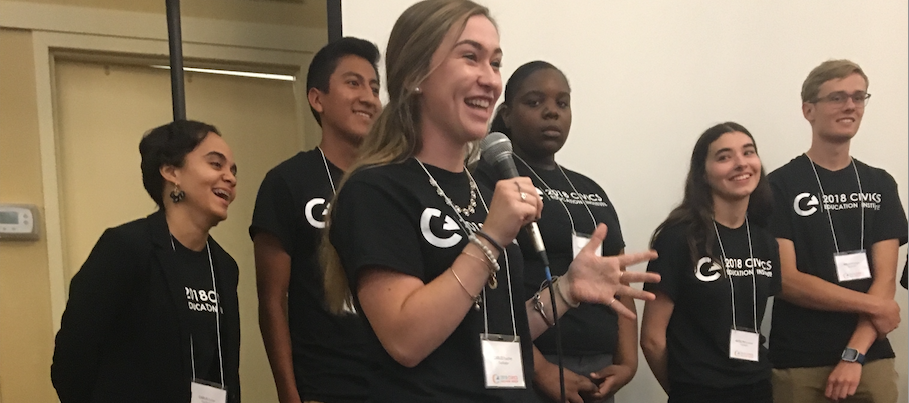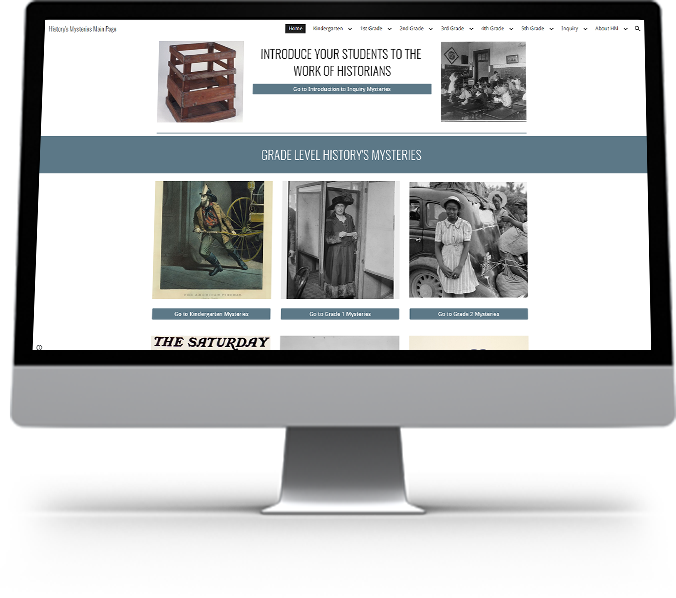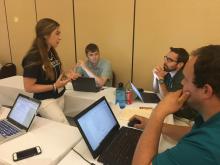
Support All Learners in Civics
REGISTER FOR: March 11, 2026 - Disability and Young Voters: Access, Legislation and Mobilizing Young Voters - A National Civic Learning Week Discussion.
Reform to Equal Rights: K-12 Disability History Curriculum features lessons to support inclusive civic engagement projects in grades 6-8 & grades 9-12. Includes information on civics projects for disability rights.
Emerging America strives to ensure that every student has support to participate in civics education including civics projects in the community.
Civic engagement and service-learning engage diverse learners in authentic work that motivates because it matters in the world. Emerging America founder, Rich Cairn, has been a national leader in community-based learning since the 1980s.
Unfortunately, students with disabilities are too often deprived of civics education. (See Emerging America blog posts by Rich Cairn and by Leah Bueso.) Civics programs are finally beginning to turn attention to inclusion of students with disabilities.
Emerging America offers many resources through the Accessing Inquiry digital clearinghouse that support inclusive instruction in civics and history. The page below features exciting resources focused especially on inclusion in civic education. Contact us about workshops and courses.
Disability History & Civics Extension to the EAD Roadmap
Emerging America is a proud sponsor of the 2021 Educating for American Democracy Roadmap. This vital framework raises the profile of history and civics education across grades and advances the central role of inquiry.
With the Learning Disabilities Association of America, Emerging America helped draft an Educating for American Democracy Roadmap Disability History and Civics Extension. This document presents a framework and penetrating questions to guide both the inclusion of students with disabilities in civics and of a narrative of people with disabilities across American history and civic life. Emerging America published the Reform to Equal Rights: K-12 Disability History Curriculum to support both these goals.
View the recording of a joint webinar, "Creating an Inclusive Civic and History Education for All: Educating for American Democracy," from March 25, 2021, including Louisiana teacher Kim Eckert.
Join the #TeachDisabilityHistory campaign! Led by youth and young adults from Easterseals Massachusetts. Link to the campaign.
Essential Tools for Inclusive Civic Engagement
The Massachusetts Department of Elementary and Secondary Education released an inclusive version of its Civics Project Guidebook, This is the most effective and useful support for civics projects available, including recommendations from Emerging America.
- Scott Lentine. Civic Engagement for People with Disabilities. ARC of Massachusetts. March 13, 2017.
- Links to Disability Advocacy Groups to suggest leads and contacts for student projects.
- Rubric of Student Inclusion in Civic Engagement Projects to make students accountable for inclusion.
- Inventory worksheet of School District Readiness to Engage ALL Learners in Civic Engagement.
- Harvard University's Democratic Knowledge Project offers an alternative step-by-step workbook for Student-led Civics Projects.
Other Resources to Support Inclusion in Civics:
- Massachusetts civics legislation in 2018 strengthened K-12 civics, requiring that every learner have opportunities for student led civic engagement projects in grade 8 and in high school. Also in 2018, the Massachusetts Board of Education passed a History and Social Science Framework that focuses on civics and inquiry. Emerging America has served as an advocate for Students with Disabilities throughout this effort.
- Virginia Inclusive Practices Center - Radford University - The VIPC fosters inclusive school environments that provide academic, social, emotional and physical inclusion for children and youth with disabilities. “I’m Determined” is a project that supports students to set and achieve goals and has a greater understanding of personal strengths and how to get support for areas of need.
- Teachers should attempt to ensure that community partners provide a respectful and nurturing experience for students who work with them. An introduction to how they might support students with disabilities comes from Understood.org: 7 disability etiquette tips for the workplace. Though it's written about the workplace, the guidelines apply for any community setting.
- Rich Cairn. Closing the Gap in Civics for Students with Disabilities in Classrooms from K-12. September 8, 2021.
- Leah Bueso, Guest Blog Post: Defining Civic Equity for Students with Disabilities. March 4, 2022.
- The Massachusetts Civic Learning Coalition united to pass the 2018 civic engagement law.
- See the coalition's https://www.macivicsforall.org/ site for an extensive list of organizations, curriculum, and more to support civic engagement projects.
- Coalition member iCivics offers Massachusetts-specific guides and materials and events.
- Lisa Schur and Douglas Kruse. Disability and Voting Accessibility in the 2020 Elections: Final Report on Survey Results, Submitted to the Election Assistance Commission. February 16, 2021. School of Management and Labor Relations, Rutgers University.
- Voter Turnout and Voting Accessibility for disabled voters. School of Management and Labor Relations, Rutgers University.
- Sharing Your Story for a Political Purpose - Toolkit from the Autistic Self Advocacy Network.
- Browse recordings and materials from Emerging America's Spring 2021 Inclusion for Civic Learning Webinar Series and from 2022 Massachusetts Civic Learning Week.
- Emerging America's Windows on History Local History program offers opportunities to pursue civic engagement when students research issues of historic and contemporary interest in their own community.
- Search the EmergingAmerica.org library of Teaching Resources for accessible civics lessons and classroom activities.
- Find discussions on Civic Engagement policy, programs, and teaching supports in our EmergingAmerica.org blog.
- Sign up for our monthly History eNews for updates. Use "Contact Us" button on this page.
- Find dozens of powerful civics education organizations on the Members page of the Massachusetts Civic Learning Coalition.
“You don’t have to carry a sign to support others in the movement. You can bake cookies for the meeting and that’s very important.” - Interview with Crip Camp Documentary Filmmaker Jim LeBrecht
Library of Congress TPS Civics Apps
Many of Emerging America's colleagues in the Library of Congress Teaching with Primary Sources (TPS) Consortium have developed exciting apps and curriculum on civics education. Find additional apps from the Library of Congress TPS program at these links:
- Barat’s Citizen U
- i/Civics Exploring Primary Sources: https://primarysources.icivics.org/


Citizen U is a multidisciplinary, inquiry-based civics curriculum using primary sources for elementary, middle, and high school students to foster civic knowledge, skills, and dispositions.

Case Maker features twenty pre-made civics challenges that teachers can share with their 6th-8th-grade students, or customize and annotate specifically for their needs.

DBQuest introduces students to major questions in civics and history using a Big Question as guiding light for deep examination of three selected primary sources from the Library.

Engaging Congress is a fun, interactive game that uses primary sources to explore the basic tenets of representative government and the challenges they face in contemporary society.

Kid Citizen features episodes in which children interactively explore Congress and civic engagement through historical primary sources, connecting what they find with their daily lives.

Eagle Eye Citizen is a digital resource that helps middle and high school students think critically about Congress, civic participation, and American history using primary sources from the Library.




